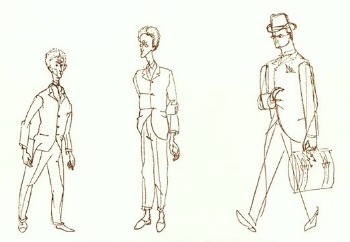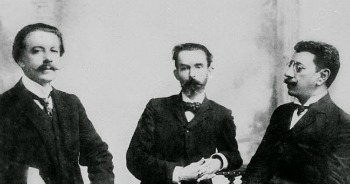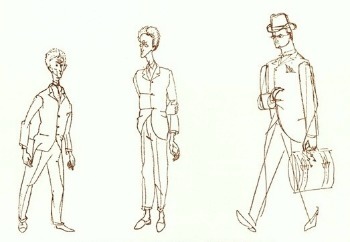You Fernando Pessoa's heteronyms they are personalities created by him and who each sign his works. Therefore, these writers have a particular biography and style.
Studies indicate that Fernando Pessoa signed texts with around 70 different names. Some consider that they are all heteronyms of Pessoa.
Others claim that those considered by many to be his main heteronyms summarize those that really are Fernando Pessoa's heteronyms, just three.
This is because the poet would have created only the biography of Alberto Caeiro, Ricardo Reis and Álvaro de Campos.
Bernardo de Campos is considered a semi-heteronym of Person. This is because this personality has characteristics very similar to those of Fernando Pessoa, being often confused with the writer himself.

Alberto Caeiro
Alberto Caeiro (1889-1915) was born in Lisbon. He is the master of heteronyms, having as disciples Ricardo Reis and Álvaro de Campos.
He spent his life in the country and lost both his father and mother at an early age, living with a great aunt. He died of tuberculosis.
Despite the date indicated for his death, there are records of poems by Alberto Caeiro from the year 1919.
Characteristics of your style
Caeiro values simplicity and demonstrates his taste for nature. For him, more important than thinking is feeling, delegating all knowledge to sensory experience.
The language of his poetry is simple, after all, Caeiro did not study beyond primary school.
poems
If, after I die...
If, after I die, you want to write my biography,
There is nothing simpler.
There are only two dates: my birth and my death.
Between one and another, every day is mine.I'm easy to define.
I saw it as a darn.
I loved things without any sentimentality.
I never had a wish I couldn't fulfill, because I never blinded.
Even listening was never for me but an accompaniment to seeing.
I understood that things are real and all different from each other;
I understood this with my eyes, never with my thoughts.
To understand this with thought would be to find them all the same.One day it gave me sleep like any child.
I closed my eyes and slept.
Besides, I was Nature's only poet.
I'm a herd keeper
I am a herd keeper.
the herd is my thoughts
And my thoughts are all sensations.
I think with my eyes and with my ears
And with hands and feet
And with the nose and mouth.
To think of a flower is to see it and smell it
And eating a fruit is knowing its meaning.So when on a hot day
I feel sad to enjoy it so much,
And I lie lengthways on the grass,
And I close my hot eyes,
I feel my whole body lying in reality,
I know the truth and I am happy.
Ricardo Reis
Ricardo Reis was born in 1887 in Porto, the date of his death is not known.
He studied Medicine and, before that, at a Jesuit College. He went to live in Brazil in 1919, after the establishment of the republic in Portugal (1910), because he was a monarchist.
Characteristics of your style
Just as Caeiro values simplicity, Ricardo Reis likes what is simple, but in a sense of opposition to what is modern.
Traditionally, for him, modernity is a show of decadence. Its language is classical and its vocabulary erudite.
poems
follow your destiny
follow your destiny,
Water your plants,
Love your roses.
the rest is the shadow
From alien trees.The reality
It's always more or less
What we want.
only we are always
Just like us.Smooth is living alone.
great and noble is always
Living simply.
leave the pain in the wings
As an ex-voto to the gods.
See life from afar.
Never interrogate her.
she can't
Tell yourself. The answer
It is beyond the gods.
but serenely
imitates Olympus
In your heart.
the gods are gods
Because they don't think.
to be big, be whole
To be big, be whole: nothing
Your exaggerate or exclude.
Be all in everything. put how much are you
At least you do.
So in each lake the whole moon
Shines because high lives
Álvaro de Campos
Álvaro de Campos was born in Tavira, Portugal, in the year 1890. The date of his death is not known.
Graduated in Engineering in Scotland, he did not practice the profession.
Characteristics of your style
Álvaro de Campos values modernity and is a pessimist, because despite his taste for progress, the present time distresses him.
His style can be defined in three phases: decadent, progressive and pessimistic.
The day came to rainy
The day came to rainy.
The morning, however, was quite blue.
The day came to rainy.
Since morning I was a little sad.Anticipation? Sadness? Nothing at all?
I don't know: when I woke up I was already sad.
The day came to rainy.I know: the dimness of the rain is elegant.
I know: the sun oppresses, being so ordinary, an elegant one.
I know: being susceptible to changes in light is not elegant.
But who told the sun or others that I want to be elegant?
Give me the blue sky and the visible sun.
Mist, rain, darkness—that's me in me.Today I just want peace.
I would even love home, as long as I didn't have it.
I get sleepy from wanting to have peace.
Let's not exaggerate!
I am actually sleepy, without explanation. The day came to rainy.Affections? Affections? They are memories...
You have to be a child to have them...
My lost dawn, my true blue sky!
The day came to rainy.Beautiful mouth of the caretaker's daughter,
Fruit pulp from a heart for eating...
When was that? I do not know...
In the blue of the morning...The day came to rainy.
What's in me is mostly tiredness
What's in me is mostly tiredness
Not this or that,
Not even everything or nothing:
Tiredness like that, himself,
Tiredness.The subtlety of useless sensations,
The violent passions for nothing,
Intense loves for the supposed someone.
All these things -
These and what is missing in them eternally -;
All this makes you tired,
This tiredness,
Tiredness.There are undoubtedly those who love the infinite,
There are undoubtedly those who want the impossible,
There are undoubtedly those who do not want anything -
Three types of idealists, and I none of them:
Because I infinitely love the finite,
Because I impossibly wish for the possible,
Because I want everything, or a little more, if I can be,
Or even if it can't be...It's the result?
For them the life lived or dreamed,
For them the dream dreamed or lived,
For them the mean between everything and nothing, that is, this...
For me just a big one, a deep one,
And, ah with what infertile happiness, tiredness,
A supreme weariness.
Very, very, very. very much,
Tiredness...
Fernando Pessoa
Fernando Pessoa he is one of the most exemplary Portuguese writers. He was born in Lisbon in 1888, but lost his father at age 5 and went to Africa, where he began his studies. His mother had married a military man named consul in South Africa.
At the age of 17, he returned permanently to Portugal, where he lived until the end of his life in 1935.
A modernist, Pessoa stood out not only with his orthonym poetry, in which he signs as Fernando Pessoa, as he is well known for creating heteronyms.
Curiosity
Recent studies by the Brazilian José Paulo Cavalcanti Filho, member of the Pernambuco Academy of Letters, point to the existence of 127 pseudonyms, heteronyms, semi-heteronyms, fictional characters and poets psychics.
Read:
- me lyric
- Modernism in Portugal
- Orphism in Portuguese Literature


